
The National Science Foundation (NSF) is an independent agency of the United States government that supports fundamental research and education in all the non-medical fields of science and engineering. Its medical counterpart is the National Institutes of Health. With an annual budget of about $8.3 billion, the NSF funds approximately 25% of all federally supported basic research conducted by the United States' colleges and universities. In some fields, such as mathematics, computer science, economics, and the social sciences, the NSF is the major source of federal backing.
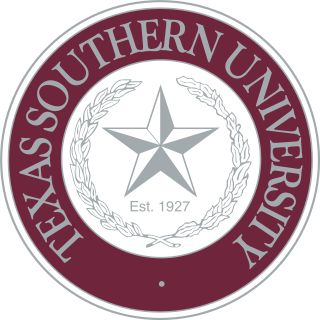
Texas Southern University is a public historically black university in Houston, Texas. The university is one of the largest and most comprehensive historically black college or universities in the United States with nearly 10,000 students enrolled and over 100 academic programs. The university is a member school of the Thurgood Marshall College Fund and it is accredited by the Southern Association of Colleges and Schools. It is classified among "R2: Doctoral Universities – High research activity".
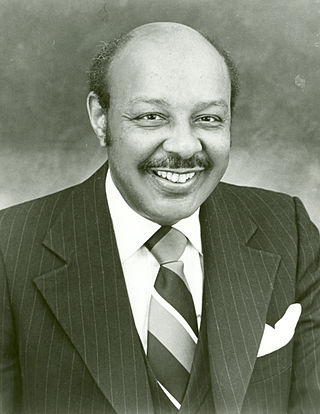
Louis Stokes was an American attorney, civil rights pioneer and politician. He served 15 terms in the United States House of Representatives – representing the east side of Cleveland – and was the first African American congressman elected in the state of Ohio. He was one of the Cold War-era chairmen of the House Intelligence Committee, headed the Congressional Black Caucus, and was the first African American on the House Appropriations Committee.
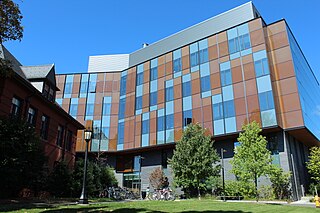
The School of Engineering is one of the ten schools that comprise Tufts University. The school offers undergraduate and graduate degrees in several engineering disciplines and computer science fields. Along with the School of Arts and Sciences (A&S) and the Fletcher School of Law and Diplomacy, the School of Engineering is located on the university's main campus in Medford and Somerville, Massachusetts. Currently, the engineering school enrolls more than 800 full-time undergraduates and 600 graduate students. The school employs over 100 full-time and part-time faculty members.
Science, technology, engineering, and mathematics (STEM) is an umbrella term used to group together the distinct but related technical disciplines of science, technology, engineering, and mathematics. The term is typically used in the context of education policy or curriculum choices in schools. It has implications for workforce development, national security concerns and immigration policy, with regards to admitting foreign students and tech workers.
Science outreach, also called education and public outreach or simply public outreach, is an umbrella term for a variety of activities by research institutes, universities, and institutions such as science museums, aimed at promoting public awareness of science and making informal contributions to science education.
Adriel Duland Johnson Sr. was an American biologist and faculty member at the University of Alabama in Huntsville whose research focused on areas of cell biology and nutritional physiology. He was one of three faculty members who was killed in the shooting on the UAH campus on February 12, 2010.
The STEM pipeline is the educational pathway for students in the fields of science, technology, engineering, and mathematics (STEM). The start and end of this STEM pipeline are disputed, but it is often considered to begin in early education and extend into graduation or an adult career in STEM.

Rosemary Gillespie is an evolutionary biologist and professor of Environmental Science, Policy & Management, Division of Insect Biology at the University of California, Berkeley. She was the President of the American Genetics Association in 2018 and was previously President of the International Biogeography Society 2013–2015. From 2011 to 2013 she had served at the president of the American Arachnological Society. As of 2020 she is the faculty director of the Essig Museum of Entomology and a Professor and Schlinger Chair in systematic entomology at the University of California, Berkeley. Gillespie is known for her work on the evolution of communities on hotspot archipelagoes.
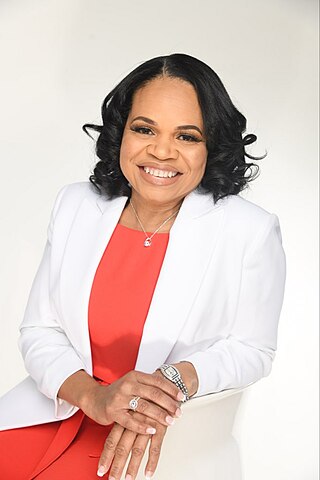
Ashanti Johnson is an American geochemist and chemical oceanographer. She is the first African American to earn a doctoral degree in oceanography from Texas A&M University.
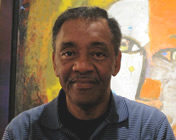
Milton Dean Slaughter is an American theoretical and phenomenological physicist and affiliate professor of physics at Florida International University. Slaughter was a visiting associate professor of physics in the Center for Theoretical Physics, University of Maryland, College Park while on sabbatical from Los Alamos National Laboratory (LANL) of the University of California from 1984 to 1985. He is also chair emeritus and university research professor of physics emeritus at the University of New Orleans (UNO). Prior to joining UNO as chair of the physics department: He was a postdoctoral fellow in the LANL Theoretical Division Elementary Particles and Field Theory Group (T-8); LANL Theoretical Division Detonation Theory and Applications Group (T-14) staff physicist; LANL Theoretical Division affirmative action representative and staff physicist; LANL assistant theoretical division leader for administration and staff physicist (T-DO); LANL Nuclear and Particle Physics Group staff physicist—Medium Energy Physics Division (MP-4); and LANL Historically Black Colleges and Universities (HBCU) project manager (laboratory-wide).
The Society for Advancement of Chicanos/Hispanics and Native Americans in Science (SACNAS) is a society that aims to further the success of Chicano/Hispanic and Native American students in obtaining advanced degrees, careers, leadership positions, and equality in the STEM field. Founded in 1973, SACNAS has over 20,000 members and 110 chapters on college campuses across the United States and United States held territories. SACNAS began in junior and high schools through graduate and undergraduate programs with the purpose of mentoring students of minority backgrounds. The society does not discriminate against any group, and benefits African American, Asian American, and white students, as well as those who are in the social sciences. In the past decade alone, SACNAS has experienced major growth. The society experienced an increased participation rate of 40% for their annual conferences between 2005 and 2010, while jumping from 32 to 50 chapters on college campuses across the nation between 2007 and 2010. The society's revenue increased as well, moving from $2.3 million to $3.8 million from 2007 to 2010, a total growth of 65%. SACNAS is the largest multicultural STEM diversity organization in the US.
Lisa D. White is an American geologist and director of Education and Outreach at the University of California Museum of Paleontology. White is a former professor of geosciences and associate dean of the College of Science and Engineering at San Francisco State University. She was elected to the California Academy of Sciences in 2000 and as a Fellow of the Geological Society of America in 2009. White was awarded her PhD in 1989 from the University of California, Santa Cruz. In 2022 the National Center for Science Education (NCSE) presented White with the 2022 "Friend of Darwin" award.
Valerie Barr is an American computer scientist, and is the Margaret Hamilton Distinguished Professor of Computer Science at Bard College. She formerly held the Jean Sammet endowed chair in the department of Computer Science at Mount Holyoke College in South Hadley, Massachusetts. She is known for her work with women in computing.

Brandeis Marshall is an American data scientist, CEO of DataedX, and Full Professor of Computer Science at Spelman College, where she is the former Chair of the Department of Computer and Information Sciences. Starting in September 2019, Marshall is a faculty associate at Berkman Klein Center for Internet & Society at Harvard University. She has also worked to broaden participation in the field of data science to increase representation of underrepresented minorities, including her effort 'Black Women in Data'.
Kathleen R. Johnson is an American member of the Grand Traverse Band of Ottawa and Chippewa Indians who is a geologist and paleoclimatologist. Her research focuses on reconstructing past climate change with speleothems, on active cave monitoring to understand the interaction of climate with speleotherm geochemistry, and analyzes climate and paleoclimate data to investigate natural climate variability. She earned a PhD from the University of California Berkeley in 2004 and is an associate professor at the University of California Irvine.
Marilyn J. Suiter is a geologist whose professional career has spanned teaching, working the oil and gas industry and public services. In her leadership roles at both the American Geosciences Institute and the National Science Foundation, Suiter has worked over decades to increase the ethnic diversity of the geosciences.
Raegan J. Higgins is an American mathematician and co-director of the EDGE program for Women. She is also one of the co-founders of the website Mathematically Gifted & Black, which highlights the accomplishments of Black mathematicians.
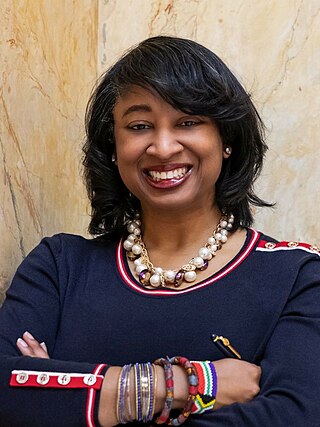
Renetta Garrison Tull is an American electrical engineer, global policy strategist, and works to advance diversity and inclusion in science, technology, engineering, and mathematics (STEM). Tull is the inaugural Vice Chancellor of Diversity, Equity, and Inclusion at University of California, Davis and a founding Director of the National Science Foundation funded program PROMISE: Alliances for Graduate Education and Professoriate, which aims to increase the number of underrepresented students in STEM. Tull previously served as Vice Provost for Strategic Initiatives at the University of Maryland, Baltimore County (UMBC) and was also the Director of Graduate and Professional Pipeline Development for the University System of Maryland (USM) where she also served as the co-Principal Investigator and co-director of the Louis Stokes Alliance for Minority Participation. On a global scale, Tull was selected as the keynote speaker for the United Nations Educational, Scientific and Cultural Organization (UNESCO) event on the Commission on the Status of Women in Engineering Fields, and was the only American and only female finalist for the Global Engineering Deans Council Airbus Diversity Award in 2015.
According to the National Science Foundation women and racial minorities are underrepresented in Science, technology, engineering, and mathematics. Scholars, governments, and scientific organizations from around the world have noted a variety of explanations contributing to this lack of racial diversity, including higher levels of discrimination, implicit bias, microaggressions, chilly climate, lack of role models and mentors, and less academic preparation.








